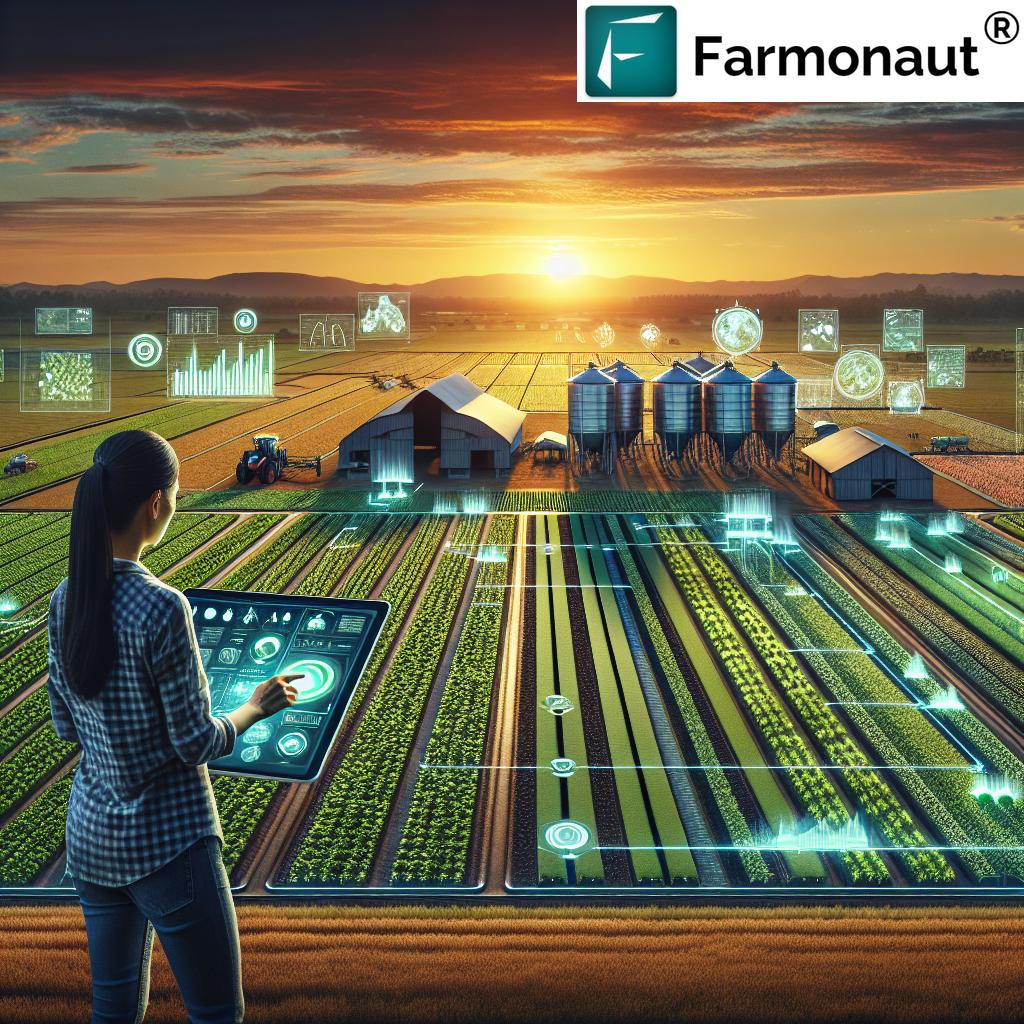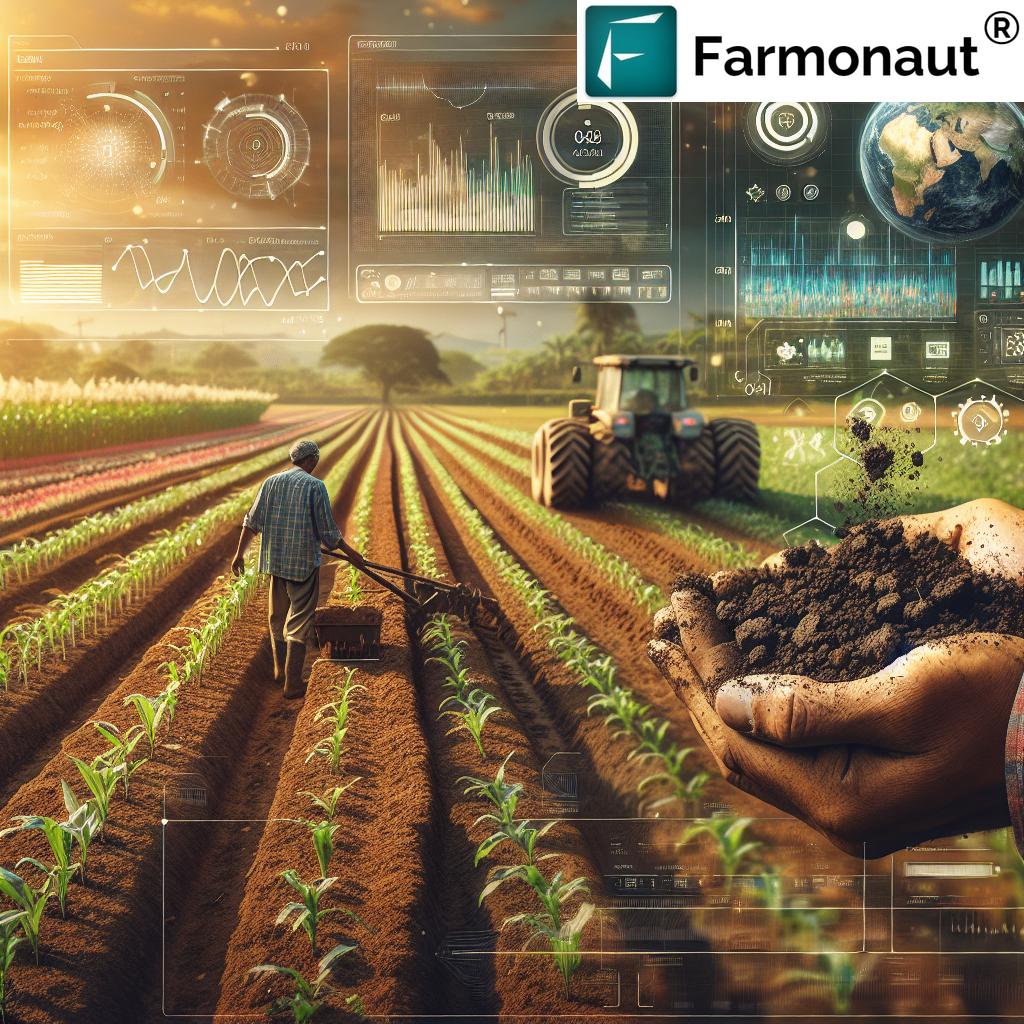Agtech Revolution: How Farmonaut’s Precision Agriculture Technology is Shaping Sustainable Farming Practices

“Business Intelligence Analysts in agriculture analyze over 50 different factors to provide comprehensive agribusiness intelligence and farm decision support.”
In the ever-evolving landscape of agriculture and agribusiness, staying informed about market trends and agricultural economics is crucial for farmers and industry professionals. As we delve into the world of precision agriculture technology and its impact on sustainable farming practices, we’ll explore how companies like Farmonaut are revolutionizing the way we approach agriculture in the 21st century.
The Rise of Precision Agriculture Technology
Precision agriculture technology has emerged as a game-changer in the farming industry, offering unprecedented levels of insight and control over agricultural processes. At the forefront of this revolution is Farmonaut, a pioneering agricultural technology company that provides advanced, satellite-based farm management solutions.
Farmonaut’s mission is to make precision agriculture affordable and accessible to farmers worldwide by integrating innovative technology and data-driven insights into traditional farming practices. This approach not only enhances productivity but also promotes sustainability in agriculture.
Key Technologies Driving the Agtech Revolution
- Satellite-Based Crop Health Monitoring: Utilizing multispectral satellite images to provide real-time insights into vegetation health, soil moisture levels, and other critical metrics.
- AI-Driven Advisory Systems: Farmonaut’s Jeevn AI delivers personalized farm advice, weather forecasts, and expert crop management strategies.
- Blockchain-Based Traceability: Ensuring transparency and security in agricultural supply chains.
- Fleet and Resource Management: Optimizing logistics and reducing operational costs for agribusinesses.
- Carbon Footprinting: Helping businesses monitor and reduce their environmental impact.
The Impact of Precision Agriculture on Sustainable Farming
Precision agriculture technology, such as that offered by Farmonaut, is making significant strides in promoting sustainable farming practices. By providing farmers with detailed, real-time data about their crops and soil conditions, these technologies enable more efficient use of resources, reduce waste, and minimize environmental impact.
Benefits of Precision Agriculture for Sustainable Farming
- Optimized Resource Usage: Precise application of water, fertilizers, and pesticides based on actual crop needs.
- Reduced Environmental Impact: Minimizing chemical runoff and soil degradation through targeted treatments.
- Improved Crop Yields: Data-driven decision-making leads to healthier crops and higher yields.
- Energy Efficiency: Better management of farm machinery and reduced fuel consumption.
- Biodiversity Conservation: Precision farming techniques can help preserve natural habitats by maximizing productivity on existing farmland.
“Precision agriculture technology has increased crop yields by up to 30% while reducing water usage by 20% in sustainable farming practices.”
Farmonaut’s Role in Shaping Sustainable Farming Practices
Farmonaut’s suite of technologies plays a crucial role in advancing sustainable farming practices. By providing farmers with access to satellite imagery, AI-driven insights, and blockchain-based traceability, Farmonaut empowers agricultural professionals to make informed decisions that benefit both their bottom line and the environment.
Key Features of Farmonaut’s Platform
- Real-Time Crop Monitoring: Enables farmers to detect issues early and take prompt action.
- AI-Powered Recommendations: Personalized advice for optimal crop management and resource allocation.
- Blockchain Traceability: Enhances supply chain transparency and consumer trust.
- Carbon Footprint Tracking: Helps farms and agribusinesses monitor and reduce their environmental impact.
- Fleet Management: Optimizes logistics and reduces fuel consumption in agricultural operations.
Explore Farmonaut’s API for advanced integration options
The Economic Impact of Precision Agriculture
The adoption of precision agriculture technologies like those offered by Farmonaut not only promotes sustainability but also has significant economic benefits for farmers and agribusinesses. By optimizing resource use and improving crop yields, these technologies can lead to substantial cost savings and increased profitability.
Economic Benefits of Precision Agriculture
- Reduced Input Costs: Precise application of water, fertilizers, and pesticides leads to lower expenses.
- Increased Crop Yields: Data-driven decision-making results in higher productivity and revenue.
- Improved Labor Efficiency: Automation and optimization of farm tasks reduce labor costs.
- Better Risk Management: Real-time monitoring and predictive analytics help mitigate crop losses.
- Enhanced Market Access: Traceability features can open up premium markets for sustainably produced crops.
Access Farmonaut’s API Developer Documentation for integration guidance
Comparing Precision Agriculture Technologies
To better understand the impact of precision agriculture technologies like those offered by Farmonaut, let’s take a look at a comparison of various solutions in the market:
| Technology Type | Estimated Global Adoption Rate (%) | Potential Yield Increase (%) | Estimated Water Savings (%) | Projected Cost Savings for Farmers (%) | Environmental Impact Score (1-10) |
|---|---|---|---|---|---|
| Satellite Imagery (e.g., Farmonaut) | 35 | 20-30 | 15-25 | 15-20 | 9 |
| IoT Sensors | 25 | 15-25 | 10-20 | 10-15 | 8 |
| Drone-based Monitoring | 20 | 10-20 | 5-15 | 8-12 | 7 |
| AI-driven Analytics | 30 | 25-35 | 20-30 | 20-25 | 9 |
| Variable Rate Technology | 15 | 10-20 | 10-20 | 10-15 | 8 |
As we can see from this comparison, satellite imagery-based solutions like Farmonaut offer significant advantages in terms of yield increase, water savings, and environmental impact. The high adoption rate also indicates growing trust in this technology among farmers and agribusinesses.
Farmonaut’s Approach to Sustainable Agriculture
Farmonaut’s commitment to sustainable agriculture is evident in its comprehensive suite of tools designed to optimize farming practices while minimizing environmental impact. Let’s delve deeper into how Farmonaut’s technologies contribute to sustainable farming:
1. Precision Resource Management
Farmonaut’s satellite-based crop health monitoring system provides farmers with accurate, real-time data on crop conditions. This allows for precise application of water, fertilizers, and pesticides, reducing waste and minimizing environmental impact.
- Water Conservation: By monitoring soil moisture levels, Farmonaut helps farmers optimize irrigation schedules, potentially reducing water usage by up to 25%.
- Targeted Fertilizer Application: Precise nutrient management based on crop needs reduces excess fertilizer use, preventing runoff and soil degradation.
- Integrated Pest Management: Early detection of pest issues allows for targeted treatments, reducing overall pesticide use.
2. AI-Driven Decision Support
The Jeevn AI advisory system integrates multiple data sources to provide personalized recommendations for farm management:
- Weather-Smart Farming: Accurate weather forecasts help farmers plan activities to minimize resource waste and crop damage.
- Crop Rotation Suggestions: AI-driven insights on optimal crop rotations help maintain soil health and reduce the need for chemical inputs.
- Yield Prediction: Advanced analytics enable better harvest planning and market timing, reducing food waste.
3. Blockchain-Based Traceability
Farmonaut’s blockchain technology enhances sustainability through improved supply chain transparency:
- Sustainable Sourcing: Enables consumers and businesses to verify the sustainability claims of agricultural products.
- Reduced Food Fraud: Enhances trust in the food system, potentially reducing overproduction and waste.
- Incentivizing Sustainable Practices: Traceability can lead to premium pricing for sustainably produced crops, encouraging wider adoption of eco-friendly farming methods.
4. Carbon Footprint Monitoring
Farmonaut’s carbon footprinting tools help agribusinesses measure and reduce their environmental impact:
- Emissions Tracking: Real-time monitoring of greenhouse gas emissions from farm operations.
- Carbon Sequestration Potential: Insights into practices that can increase soil carbon storage.
- Sustainability Reporting: Facilitates compliance with environmental regulations and sustainability certifications.
The Future of Sustainable Agriculture with Farmonaut
As we look to the future, the role of precision agriculture technologies in shaping sustainable farming practices will only grow. Farmonaut is at the forefront of this revolution, continuously innovating to meet the evolving needs of farmers and the planet.
Emerging Trends and Future Developments
- Integration with IoT Devices: Combining satellite data with ground-level IoT sensors for even more precise farm management.
- Advanced AI and Machine Learning: Developing more sophisticated predictive models for crop yield, disease outbreaks, and market trends.
- Expansion of Blockchain Applications: Extending traceability solutions to cover more aspects of the agricultural supply chain.
- Climate-Smart Agriculture: Enhancing tools to help farmers adapt to and mitigate the effects of climate change.
- Precision Livestock Farming: Applying similar technologies to animal husbandry for more sustainable meat and dairy production.
Conclusion: Embracing the Agtech Revolution
The agtech revolution, spearheaded by companies like Farmonaut, is transforming agriculture into a more sustainable, efficient, and productive industry. By leveraging cutting-edge technologies such as satellite imagery, AI, and blockchain, Farmonaut is empowering farmers to make data-driven decisions that benefit both their bottom line and the environment.
As we face global challenges like climate change, food security, and resource scarcity, the importance of sustainable farming practices cannot be overstated. Precision agriculture technologies offer a path forward, enabling us to produce more food with fewer resources while minimizing our environmental impact.
For farmers, agribusinesses, and policymakers alike, embracing these technologies is not just an opportunity – it’s a necessity. By adopting solutions like Farmonaut, we can work towards a future where agriculture is not only highly productive but also environmentally sustainable and economically viable for farmers around the world.
The agtech revolution is here, and it’s shaping the future of farming. Are you ready to be part of it?

Frequently Asked Questions (FAQ)
- What is precision agriculture technology?
Precision agriculture technology refers to the use of advanced tools and data analysis to optimize farming practices, including satellite imagery, IoT sensors, AI, and blockchain. - How does Farmonaut’s satellite-based crop monitoring work?
Farmonaut uses multispectral satellite images to analyze crop health, soil moisture, and other key metrics, providing real-time insights to farmers. - What are the main benefits of using Farmonaut for farmers?
Farmers can benefit from increased crop yields, reduced input costs, better resource management, and improved sustainability through Farmonaut’s precision agriculture solutions. - Is Farmonaut suitable for small-scale farmers?
Yes, Farmonaut aims to make precision agriculture accessible to farmers of all scales, offering affordable solutions that can be tailored to different farm sizes. - How does Farmonaut contribute to sustainable farming practices?
Farmonaut promotes sustainability by optimizing resource use, reducing chemical inputs, minimizing environmental impact, and enabling better farm management decisions. - Can Farmonaut’s technology be integrated with existing farm management systems?
Yes, Farmonaut offers API access, allowing for integration with other farm management tools and systems. - What types of crops can be monitored using Farmonaut?
Farmonaut’s technology can be applied to a wide range of crops, including grains, fruits, vegetables, and cash crops. - How does Farmonaut’s blockchain traceability benefit the agricultural supply chain?
Blockchain traceability enhances transparency, reduces fraud, and builds consumer trust by providing verifiable data on a product’s journey from farm to consumer. - Is training required to use Farmonaut’s platform?
While Farmonaut’s platform is designed to be user-friendly, they likely offer training and support to help users maximize the benefits of their technology. - How can agribusinesses benefit from Farmonaut’s fleet and resource management tools?
These tools help optimize logistics, reduce operational costs, and improve overall efficiency in managing agricultural machinery and resources.






